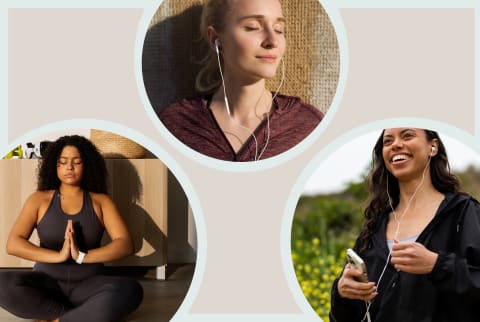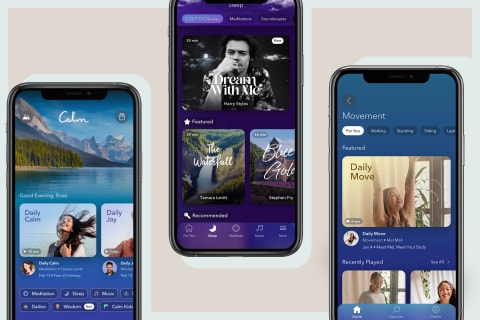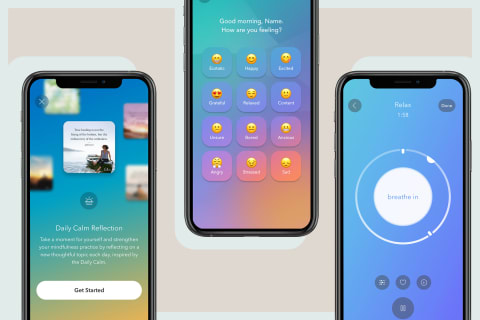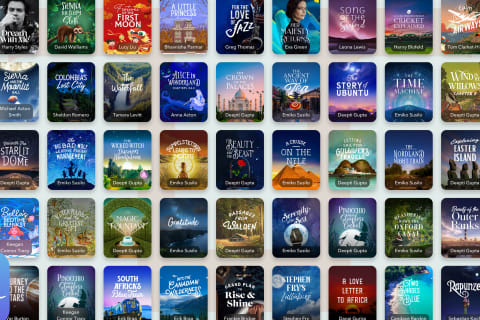Advertisement
Is The Calm App Worth Trying? A Full Review Of The Popular Meditation App


It's ironic to think that more tech can help us combat the stressors of modern life. But in the case of using meditation apps to help manage anxiety, a racing mind, and overthinking, it can actually be true.
Some tech tools are actually helpful to manage our minds and bodies—and after spending just one week on the Calm app, I'd say this is definitely one of them.
I've had meditation experiences ranging from full-day, in-person meditation retreats, learning from meditation teachers over Zoom, and using other apps like Headspace and Insight Timer. Even for someone like me with quite a bit of experience with meditating, the Calm app helped strengthen my mindfulness toolbox to effectively get me through my week.
What is the Calm app?

While there are a good number of meditation apps on the market, Calm feels a bit different from the rest. From its neuroscience-inspired origins, light use of pop culture, and polished aesthetic, Calm feels like the cool spiritual uncle you want to hang out with.
The Calm app was founded in 2012 by Alex Tew and Michael Acton Smith. According to an Inc. report, the origin story of the app starts with Smith's bout of burnout and a big dose of skepticism around the "woo-woo" of meditation. But after cultivating his own mindfulness practice and reading more about the neuroscience behind meditation, Smith was convinced it was the right focus for his next business venture.
Over the years, Calm's popularity has grown, snagging Apple's "App of the Year" in 2017. With over 4 million users, Calm continues to receive high praise on The App Store (4.8 stars) and Google Play Store (4.4 stars).
In general, accessing meditation and mindfulness through an app is way more convenient than researching a meditation studio, making your way there, sitting for 30 to 60 minutes, and making your way back home.
If your goal is to make meditation and mindfulness a daily habit, using an app lowers the barrier, making your mindfulness practice as convenient as possible. With Calm, you simply sit wherever you are, open the app, and select a Calm meditation.
How the app works
The Calm app is essentially a massive library of audio and video content meant to guide you through various meditation, mindfulness, and wellness-related exercises and activities. The app is broken down into 11 categories of content, which you can filter by 16 goals from "Start Meditating" to "Wellness at Work" to "Sleep Support."
Some noteworthy categories and features include:
- Sleep Stories: Calm Sleep Stories are like warm blankets of soothing music, sounds, and voice talent. Each story is crafted to lull you to sleep.
- Soundscapes: Calm Soundscapes are location-inspired soundtracks that transport you to anywhere in the real world and beyond. Calm offers to transport you to the streets of Carnivale, a rain forest, the Alpine mountains, and the Dunder Mifflin Office (in case you find ringing desk phones and whirring printers soothing).
- Music: Calm Music is a collection of music tracks curated by Calm and categorized into 12 genres: Piano, Ambient & Atmospheric, Electronic, Classic & Strings, Remix, Beats, Guitar, Nature Melodies, Sound Baths, Vocals, Lullabies, New Age.
- Movement: This is one of the offerings that starts to differentiate Calm from other meditation apps. Calm offers video guidance with yoga and meditation teacher Mel Mah to move your body with intention.
- Calm Kids: Calm Kids features sleep stories, meditations, and lullabies for the little ones, teens, and big kids in your life, offering a great way to introduce mindfulness into your kids' lives.
- Check Ins: Calm prompts you to check in with how you're feeling using an emoji and journaling about it.
- Breathing Exercises: Breath is a tool nearly everyone has access to. Calm offers six breathing exercises to help you Balance, Energize, Focus, Relax, Restore, and Unwind.

Visually the app is really pretty to look at, though it might be overwhelming to a brand-new user. To help with that, the app's home page offers a "What can we help with today?" prompt that you can follow, after which the app will curate a suggested "For You" list of content that will likely be more relevant for what you need.
The science behind the app
Cited in the ancient Vedic texts, the practice of meditation dates back to 1500 B.C.1 in the Vedic Age of India as a way to "connect oneself to one's deep inner Self," according to a 2015 paper1 by Hari Sharma, M.D., physician and Ayurvedic practitioner at the Center for Integrative Medicine at The Ohio State University.
Since then, disciplines in neuroscience, psychology, and biology have helped us to scientifically understand the benefits of meditation. A multitude of studies2 has found that meditation has innumerable benefits for the mind and for overall health, including:
- Reducing stress
- Decreasing anxiety
- Decreasing depression
- Improving memory
- Improved cardiovascular health
- Pain reduction
According to Calm, the app's meditation offerings are grounded in scientific research. The company even has their own research arm, Calm Science, to support their commitment to "developing evidence-based sleep and mindfulness resources, informed by rigorous scientific research."
The site lists 24 evidence-based research publications where they provide findings on their studies between 2019 and 2021. One survey of Calm subscribers who used the app more than five times per week yielded highly positive results:
- 84% saw improvement in mental health
- 81% reported less stress
- 73% expressed higher sleep quality
Calm Premium vs. free version
The main difference between the free and paid versions of Calm is access to more content with more frequent releases. If you're a person who only anticipates using minimal content, you may be able to use the free version just fine. If you like variety and are looking for a tool to help cultivate your daily mindfulness practice, the paid version—known as Calm Premium—is for you.
If you're debating between the free and paid versions of Calm, you can try Calm Premium (the paid version) for free for seven days to decide if it's worth it to you. As soon as you sign up, you're required to input your credit card information to access content (even for the free trial), but you can cancel anytime, which essentially makes the trial free of charge.
With the free version of Calm, you get access to:
- Timed meditations
- The first day of Calm's multiday meditation programs
- One Breathing Exercise
- One Sleep Story titled "Blue Gold"
- Page of mindfulness tools on desktop
If you're using the free version, pop-ups throughout the mobile app will encourage you to unlock more content by paying for the Calm Premium subscription.
Here's what's included in Calm Premium:
- Multiple original daily offerings
- Hours of guided meditations covering sleep, anxiety, stress, gratitude, and more
- A library of more than 200 Sleep Stories, with new stories added every week
- Exclusive music for focusing, relaxation, and sleep
- Masterclasses featuring well-known mindfulness experts

Is the Calm app worth it?
While the free version is limited, the paid version is definitely worth it for the wide array of meditations and courses available. It's also fun to have celebrity features on the app, like a bedtime story narrated by Idris Elba and an Ariana Grande Sleep Remix, which are unique to Calm.
From an inclusivity standpoint, I'm happy to see practitioners like Lama Rod Owens featured with a "Coming Out" series caring for the LGBTQ+ community, and actress and LGBTQ+ changemaker Emily Rios narrates a sleep story called "Dreaming with Frida."
Overall, I'm a fan of the Calm app, and I'll likely keep it for the Daily Jays, walking meditations, and sound bath music. It has easily become part of my morning routine, and I've only had it for a week.
Though, while I personally like this app, it's not for everyone. This probably isn't for experienced meditation practitioners who want to deepen their meditation practice in any specific tradition. Those looking for a more robust practice will need to look for a meditation school.
Pros:
- Wide selection of mindfulness tools and meditations
- Informative content that encourages learning more about topics like anxiety and stress
- Fun content that doesn't take mindfulness too seriously
- Mobile and desktop versions
- Beautifully designed
- Large Calm user base with 4 million paid users
- Content narrated by celebrities and well-known meditation experts
Cons:
- Can be overwhelming to navigate through the app because there is so much to choose from
- Limited access to content with free version
- May not help with building a consistent meditation practice
- Distracting background noise can be difficult to figure out how to turn off
- Slow loading while on the go if you haven't pre-loaded the content
What real users say
Here are some real-life Calm user quotes in the wild:
- "I'm not a meditation person but I like using Calm for the music and Daily Calm series" —Kristen, 34
- "It will help you through sleepless nights—worth the annual membership." —tashhi, via The App Store
- "I got [Calm] for the sleep stories but the only good ones were Stephen Fry and Matthew McConaughey. All the rest had really annoying background music you couldn't turn off. The nature sounds were nice but you don't need the app for that. Overall nah it wasn't worth it." —Puzzleheaded_wait739, a Reddit user
- "The description says that much of the app is free, but I can't find any of the free features." —Heather, via Google Play Store
- "I downloaded Calm as part of my therapy program back in February, paid for the premium edition pretty soon after. I like it better than Headspace and find it worth it." —Kriskabelle, a Reddit user
FAQ
How much does the calm app cost?
Although limited, Calm has a free version, but it provides a tiny offering compared to the full app. Calm Premium is $15/month or $70/year, but promotions seem to be offered regularly (e.g., 30% off in your first year). If you have health insurance through Kaiser Permanente, you can access Calm at no cost.
Is there a better app than Calm?
While other meditation apps exist, few can compete with what Calm offers. For the breadth of meditations, mindfulness tools, fun pop culture references, celebrity features, visual aesthetic, efforts toward inclusive content and offerings, Calm is the best app on the market right now.
Which app is better: Headspace or Calm?
Headspace is the perfect app for people who are new to meditation, while Calm better suits those who have some experience with it already and are simply looking for more guided experiences.
Personally, both Headspace and Calm have a special place on my meditation journey. I started to learn the basics of meditation with Headspace. I took a break because I finished all the basic meditation courses. I'm now converting to Calm because it has a broader variety of mindfulness tools to support my meditation practice—and it's prettier to look at.
The takeaway
The Calm app is great for a wide range of people because it has so much to offer. It can help the busy professional use mindfulness during their workday. It can help new parents bond with their kids over audio stories. It can even help those who are experiencing a rough patch and need just a bit of mindful encouragement throughout the day.
I'm surprised it took me this long to try the Calm app. I've heard and read great things about it for a few years, and now I can see why. Adding this to my routine has helped inject a few minutes of serenity into my day. Overall, I'd say the Calm app is a great tool to help move people from chaos to calm.